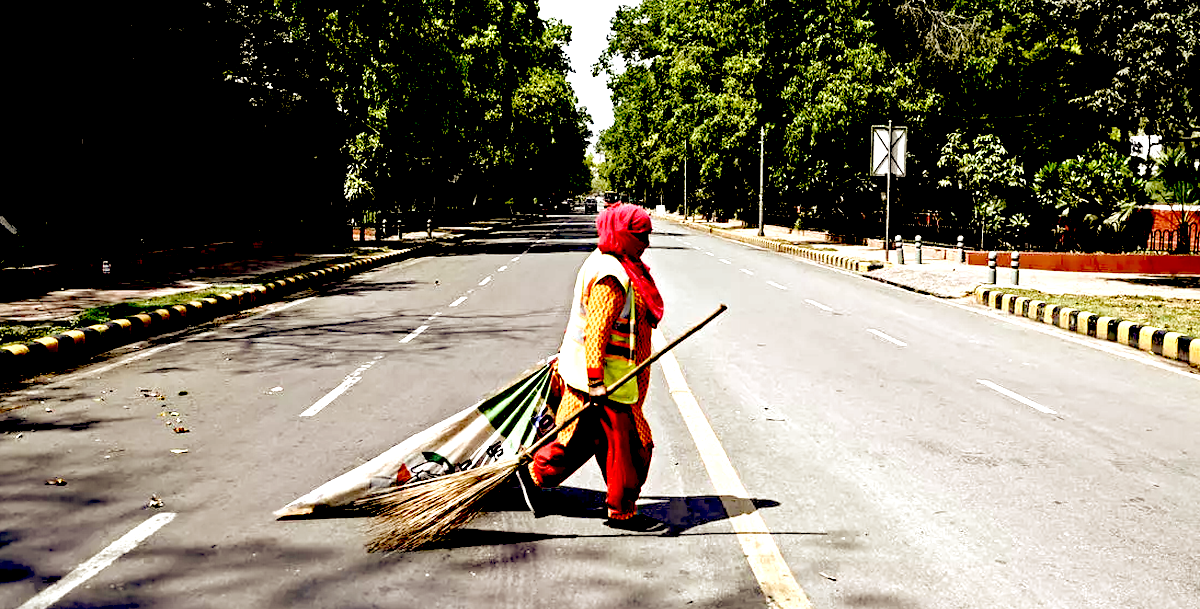In India, Covid started as a disease brought in by the rich—those who travel abroad, not those who work at home living payday-to-payday. The first reported Covid case last year in Mumbai’s Dharavi, one of the largest slums in Asia, of a domestic worker who worked in the home of a frequent international traveler, sent panic through the nation. What would Covid look like spreading through a densely populated urban settlement? But that’s not how the pandemic nightmare unfolded in India.
The rich and the upper-middle class stepped in to spread the disease. Unmasked parties and weddings, recreational events at upscale clubs, created sharply mutated waves just as the nation and its delusional leaders were declaring India in the “endgame” of the pandemic. Eventually, the insensitive national government powered massive religious gatherings and months of election rallies to democratize the widely cast net of irresponsibility. Now everybody is dying. The rich and the poor.
A former ambassador dies outside a hospital after a prolonged wait for a bed. Senior administrative officials feel lucky to find places on the floors of hospital rooms on which to lie—while the influential beg for medical oxygen on Twitter. The privatization of the nation’s healthcare has been glaringly revealed to be parallel to the breakdown of its public health system. As Arundhati Roy said in a recent article, it is meaningless to say the system has broken down—as the “system,” indeed, never existed. Thousands, their grief captured on video by citizen and professional journalists, mourn the loss of family members who would have lived but for the supply of oxygen. As anywhere, anytime, the poor suffer more, but in India they don’t talk about it on social media; their voices only seem to be heard when until someone else does the talking—or recording, or Tweeting—for them.
Even as the pandemic ravages entire structures and ecosystems of Indian society, it reveals the intensity and the fragile doubleness of an old bond—that of the working poor with the middle-class and beyond, in the very private spaces of daily domestic life. But what does it mean to be “untouchable” during a pandemic in which the upper classes are making the world more dangerous for the lower?
Every day, hundreds of thousands of domestic workers—those who have always done the heavy lifting in our daily lives—leave snacks and coffee put out on the table from where they pick up their salaries, to be collected when their employers are out of sight, clear of the air. Service and payment are exchanged without hands touching, breath mingling. An ancient distance of untouchability shapes our lives again. But who is afraid to touch whom?
*
As I just stepped out of the bedroom this morning and set foot in the hallway, our housekeeper told me it was not safe to be out. Amma was here. I glanced to my right and saw the woman in the mask. She saw me. We knew what we had to do.
The shadow of caste and the scourge of untouchability continues to haunt India, sparking violence and exclusion in every other corner of the nation.“Amma” literally “mother,” is an affectionate address for an older woman. Our “Amma,” a woman from Tamil Nadu who has now spent many years working in Delhi, comes to our house every morning to dust and clean the rooms for a monthly payment.
She wears the mandatory Covid mask. Once she’s inside the house, every member of the family, including our housekeeper who lives with us, begins a room-to-room game of musical chairs. Is she done with the living and the dining rooms? Which of the bedrooms is she in right now? It becomes particularly tricky when a still sleep-dazed seven-year-old starts to roam the house in search of a place to fully rouse himself awake.
Our cook comes around mid-afternoon and works for a few hours in the kitchen. I like to make coffee after lunch but cannot go into the kitchen as long as she is there. A low table is placed outside the kitchen. It is the means of communication. Tea, coffee, instructions, questions, salaries.
I’m haunted by our collective memory of untouchability. Accepting the services of those whom we cannot touch. Let them cook and clean while fleeing their breath. I try telling myself that we’re as untouchable to them as they are to us; they can get the disease from us as much as we can get it from them, and they need the salaries as much as we need their labor. But I cannot escape the dark shadow of untouchability that darkens our past.
I’ve personally never known anyone who believed another human being to be untouchable. I grew up in a modern Indian city, received a modern, liberal education; I’ve never heard anyone describe caste as a force that decides the course of their daily behavior. It doesn’t matter. It shouldn’t matter. But my memory is overcast. I am a caste-and-class-privileged man who grew up in a Hindu society that historically kept entire classes of people pinned to the lowest echelons, fearing their breath or touch as a malign force that sullies what it touches.
Now, in this pandemic, a thick plastic partition shields the driver’s seat from the rest of our car. If and when the driver comes and anyone goes out, everybody masked, we are as protected from another Covid stranger as he is from us.
This bizarre dance of distancing is happening everywhere in India. Middle-class families switch the employment of domestic workers on and off, reduce hours and days, sometimes for weeks and months. Some keep salaries unchanged while others cut staff for good as their own lives change—but for many, now in the second year of the pandemic, the existing system of hired domestic labor is back for the most part, especially for families with the ailing, the elderly, and small children.
Fine layers of ash have started to appear on the terraces of Delhi homes.An inextricable relation of quotidian intimacy links the employers with the employees, but touch and breath is taboo once again. Part-time nannies, part-time nurses, cooks and cleaners and drivers and anyone who visits from the world outside, often from densely populated housing colonies, must remain behind a door, in another breathing space.
We are masked beings to each other and often our eyes don’t meet. The pandemic forces us to reduce our mutual contact, take short and long hiatuses from each other—and yet we cannot give each other up. What is left, then, of the haunting, shared memory of an ancient untouchability?
*
Fine layers of ash have started to appear on the terraces of Delhi homes. “I live in an open space in a Delhi neighborhood,” says a tweet “and for the past few days it’s been particularly windy, smoky. But I’ve started to notice black stains, ash on the clothes I put out to dry. I didn’t know where it was coming from until I realised that I live barely a km from a crematorium.”
They are not just crematoriums. After a year of erratic suffering under the pandemic, through April and May, bodies have started to be cremated en masse in parking lots and public parks, piled next to each other across the long road to overflowing crematoriums. And they are the lucky ones; reports and videos reveal swollen and decomposed bodies washing up in the Ganges at the border of Bihar and Uttar Pradesh, deaths so numerous they cannot find last rites beyond being thrown in the river. Fear, loss, and despair have entered every single home, touched every single life. Not having had the chance to visit Calcutta in what feels forever—the city where I grew up—I have had to let go of family members, close acquaintances, elderly parents of friends, without the chance to say goodbye. Some were affected by Covid, others from different ailments, a few succumbing to the inevitability of age. But the illness of the time has touched everything.
It has been 18 months since I’ve been able to visit the elderly in my life and I know some of them will not be around when this is over (or, at least, when this becomes a more manageable reality). My grandmother-in-law passes away peacefully in a suburban home at the age of 105. My aunt, the sole surviving member of my father’s family, leaves us in her seventies, taking with her my childhood home and the last opportunity to experience a set of walls, stairwells, and corridors that made a part of me. Neither of them had Covid. But in a way, they, too, are lost to the pandemic. The inability to be by their side in their last moments. The inability to grieve—and celebrate—their lives.
A year of emptiness, despair and destruction. Faces half-remembered, for some, familiar faces, gone. A year of childhood gone from the lives of our young ones: for the fortunate, the continued dystopia of online school, for those less fortunate, the fight for digital data, the loss of learning, of community. Lives and livelihoods uprooted, ended, for migrant workers in the big cities, the long pandemic trek home through tropical summers.
These undeniable ties—of economic need and societal tradition—have survived much battering. This close connection of quotidian labor, the “outside” presence in the home that comes further “inside” than any friend or visiting family member, is an unfortunate but inevitable mutual dependency in one of the most economically polarized societies in the world. It is a bodily, habitual, nutritional and organizational bond, one which, no less than anything else, demarcates a developing country in the global south from a post-industrial economy in the global north.
It has been 18 months since I’ve been able to visit the elderly in my life and I know some of them will not be around when this is over.The shadow of caste and the scourge of untouchability continues to haunt India, sparking violence and exclusion in every other corner of the nation. The old untouchability was hinged around caste—the lottery of birth that decided one’s place in the social hierarchy of livelihoods. And there were those who were born so “low” as to live outside the structure altogether, those whose touch, breath or shadow “sullied” all those who came near.
The defining currency in this system was labor, most crucially, that of the people who cleared the debris of everyday life, of death at the crematoriums, the jobs which the privileged needed done but considered impure. The raging virus has robbed touch from our lives, of all kind, private and public, social and intimate. Ironically, then, in this deeply staggered society, the most lasting kind of touch is that which continues to enter these private niches of domestic need. And yet it is function without presence, service without visibility, maintenance without breath.
If and when we are able to make peace with the pandemic, push it far enough away to resume social and professional lives that look more recognizable, how shall we clear the shadow of untouchability? For people eager to see friends and colleagues again, those who tweet warning everybody not to fall in love with the first person they get to hug after this is over—how will it be to share kitchen space with your cook, let your child or ailing elderly be with caregivers who make their lives outside? Lives, doubtless, will return to more intricate interstices of labor and payment, embracing those suspended in the fetid breath of the sickness.
Will touchability return when everybody is touchable? Will those accepting service breathe easy in the presence of those accepting payment, step into their shadows? Has the pandemic normalized a new disembodiment of quotidian labor? A new disembodiment that smells of an ancient one?


